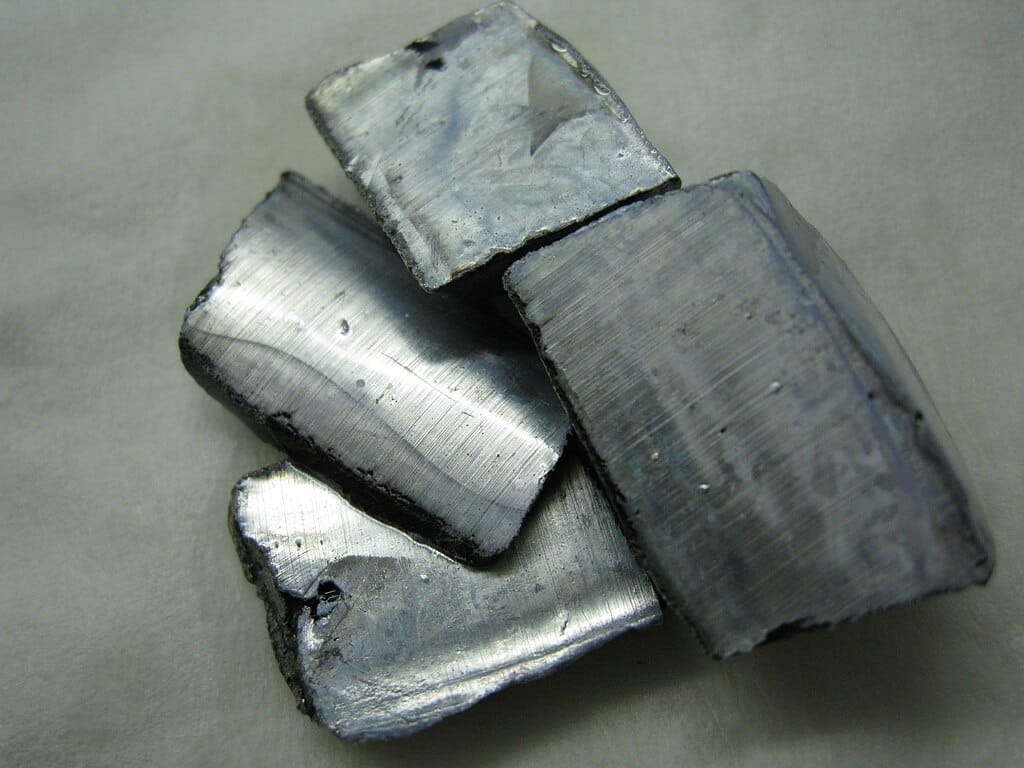potassium / potash

Potassium is a chemical element with the atomic number 19 and the symbol K. It is a soft, silvery-white, alkali metal that reacts rapidly and violently with oxygen. Potassium is necessary for life as we know it, required for nerve transmission among other cellular functions, and it has many commercial uses, notably in producing soaps and fertilizers.
Potassium was first derived from potash, the residue from burned plant matter. Potash is, unsurprisingly a compound of pot + ash. The English word appears in the early sixteenth century and has cognates in other Germanic languages. Over the centuries, exactly what is meant by potash has changed. Originally, it literally referred to the ashes of plants. Later, it denoted impure potassium carbonate obtained from such ashes; then, as methods improved, it denoted purer potassium carbonate. Senses over the years have included water with potassium salts and potassium hydroxide or caustic potash. In modern use, potash refers to any of the various salts of potassium, from whatever source, especially as used in fertilizer.
The spelling potasse, after the French, starts to be used in English-language chemistry circles by the end of the eighteenth century.
In 1807, English chemist Humphry Davy was the first to isolate the element, distinguishing it from the chemically similar sodium, and he proposed the name potassium, after the French spelling:
Potasium [sic] and Sodium are the names by which I have ventured to call the two new substances: and whatever changes of theory, with regard to the composition of bodies, may hereafter take place, these terms can scarcely express an error; for they may be considered as implying simply the metals produced from potash and soda. I have consulted with many of the most eminent scientific persons in this country, upon the methods of derivation, and the one I have adopted has been the one most generally approved. is perhaps more significant than elegant. But it was not possible to found names upon specific properties not common to both; and though a name for the basis of soda might have been borrowed from the Greek, yet an analogous one could not have been applied to that of potash, for the ancients do not seem to have distinguished between the two alkalies.
But the name was not universally accepted. Earlier, in 1797, German chemist Martin Heinrich Klaproth had suggested the names kali and natron for the alkalis of plant and mineral matter, respectively:
Mein Vorschlag gehet dahin: slatt der bisherigen Benennungen, Pflanzenalkali, vegetabilisches Laugenfalz, Pottasche, u.s.w. den Namen Kali sestzusetzen; und statt der Benennungen Mineralalkali, Soda u.s.w. zu dessen ältern Namen Natron zurück zu kehren,
(My suggestion goes like this: based on the previous names, plant alkali, vegetable lye, potash, etc. to establish the name Kali; and instead of the names mineral alkali, soda, etc. to return to its older name Natron.)
Kali is from the post-classical Latin alkali, which was borrowed from the Arabic القَلْيَه (al-qalyah, potash). In 1809, German chemist Ludwig Wilhelm Gilbert proposed calling the newly discovered element Kalium, rather than Davy’s potassium, and that name became the common one in German and the source for the symbol K.
Sources:
Davy, Humphry. “The Bakerian Lecture: On Some New Phenomena of Chemical Changes Produced by Electricity, Particularly the Decomposition of the Fixed Alkalies, and the Exhibition of the New Substances Which Constitute Their Bases; And on the General Nature of Alkaline Bodies” (19 November 1807). Philosophical Transactions of the Royal Society of London, 98, 1808, 1–44 at 32. HathiTrust Digital Archive.
Klaproth, Martin Heinrich. “Beitrag zur Chemischen Naturgeschichte des Pflanzenalkai” (1797). Sammlung der Deutschen Abhandlungen, Welche in der Königlichen Akademie der Wissenschaften zu Berlin. Berlin: Georg Decker, 1799, 68–71 at 71. HathiTrust Digital Archive.
Miśkowiec, Pawel. “Name Game: The Naming History of the Chemical Elements: Part 2—Turbulent Nineteenth Century.” Foundations of Chemistry, 8 December 2022. DOI: 10.1007/s10698-022-09451-w.
Oxford English Dictionary, third edition, December 2006, s.v. potassium, n., potass, n., potash, n.; September 2009, s.v. alkali, n. and adj.
Photo credit: Dennis S.K., 2007. Wikimedia Commons. Used under a Creative Commons Attribution 3.0 Unported license.